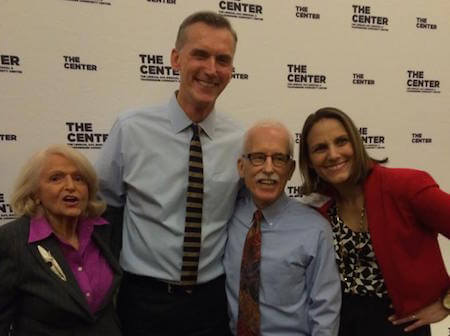Río Sofia. | COURTESY OF PLANNED PARENTHOOD OF NEW YORK CITY
BY RÍO SOFIA | I’ve been medically transitioning over the past two and a half years and have been a patient at four different clinics in New York City that specifically offer transgender health care. Before finding Planned Parenthood of New York City (PPNYC), my experience navigating all of these clinics had been one of antagonism.
From being misgendered on a regular basis by hastily trained staff and given incorrect information about the effects of medicine I was taking, to never being able to get enough time or attention from my doctors, I never felt like I was actually being taken care of. No matter how many times I left one of these clinics feeling worse than I did coming in, I always left feeling shocked and confused.
I couldn’t understand how even in such a liberal and metropolitan city like New York — and, no less, at clinics with health care programs supposedly tailored for people like me — I could have such a hard time getting decent health care. Even achieving simple tasks like getting my medication on time felt like taking on a part-time job and often involved having to jump through a series of bureaucratic hoops — only to end up getting them late anyway.
PERSPECTIVE: Health Care Is a Right
Earlier this month, PPNYC honored legendary transgender activist and actress Laverne Cox at its gala. She spoke about how often trans women are left out of conversations about women’s health and how critical it is to alleviate the complex web of barriers to care that so many trans people face in the US. This Pride Month and beyond, I’m hoping we can elevate the needs of my community.
There are approximately 1.4 million self-identifying transgender individuals living in the US today, and more than 23,000 in New York. Transgender people often face discrimination and misunderstanding from health care providers along with the violence we face from the wider community. We often don’t have safe, affirming access to primary and preventive care. Mental health issues are common in the trans community, and we are more likely to be unemployed, homeless, and lack familial support. It’s not unusual for us to have to educate our own providers, or even be denied care outright as a result of our gender identity.
Health care for trans women and gender non-conforming femmes from top to bottom is, to put it bluntly, a nightmare. Even as someone who navigates the health care system with an immense deal of privilege (I am a citizen, have insurance, live in New York City, am not low-income, and am HIV-negative), I still face insurmountable obstacles to accessing the health care I need.
For example, the availability of the estrogen I take, estradiol valerate, has been horribly inconsistent over the past two years, at times being out of stock for several months at a time, due to a manufacturing dilemma I don’t even understand at this point. Since last year, my insurance stopped covering that medication. The lack of security I experience around my health care means that I never know when I might be facing a new challenge that bars me from my medication. It’s often said that to be a trans woman in the US is to be in a constant state of hyper-vigilance; our relationship to our health care is no different.
Things have improved tremendously for me since transitioning my health care to PPNYC last year. I know that no health care provider is perfect — however, speaking for myself I can say I have not had a single negative experience like the ones I had dealt with at other clinics.
At PPNYC, I’ve never been misgendered or called by the wrong name. I’ve never felt rushed or ignored by the doctors I’ve seen, and when my medication is available I get it on time. My providers have even asked me questions about my reproductive desires, which for me was so remarkable because the reproductive rights of trans people are just blatantly disregarded by the entire health care system and reproductive health movement.
Living in this political climate, it is hard for me to imagine transgender health care getting any better when so much is being taken away from us. The current crisis in transgender health care isn’t just about ability to pay. Solving these complex issues will require a redefining of how we conceive of “access” to include health care that is affirming, empowering, and allows us to be our most authentic selves. Our community has long been marginalized in the fight for health equity, and it’s high time we centered the experiences of transgender women and femmes in our conversations about what makes a just health care system.
This is why I so ardently want to protect the relief Planned Parenthood has given me, not just for my sake but for trans communities around the country who all experience significant challenges accessing decent, affordable health care. I hope that as issues in transgender health care gain more visibility, we can see a much needed expansion in comprehensive training for doctors and health care professionals in how to provide women like me the full and compassionate healthcare we need to lead healthy lives.
Río Sofia is transgender woman living in Brooklyn and a patient at Planned Parenthood of New York City. You can follow her @rioxofia on Instagram.






































